
A physicist is a scientist who specializes in the field of physics, which encompasses the interactions of matter and energy at all length and time scales in the physical universe. Physicists generally are interested in the root or ultimate causes of phenomena, and usually frame their understanding in mathematical terms. They work across a wide range of research fields, spanning all length scales: from sub-atomic and particle physics, through biological physics, to cosmological length scales encompassing the universe as a whole. The field generally includes two types of physicists: experimental physicists who specialize in the observation of natural phenomena and the development and analysis of experiments, and theoretical physicists who specialize in mathematical modeling of physical systems to rationalize, explain and predict natural phenomena.
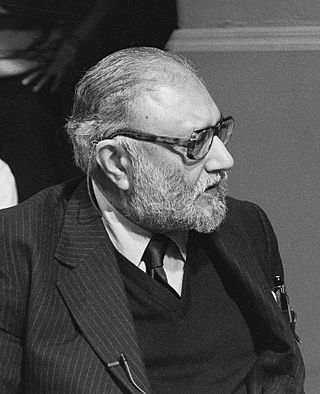
Mohammad Abdus Salam was a Pakistani theoretical physicist. He shared the 1979 Nobel Prize in Physics with Sheldon Glashow and Steven Weinberg for his contribution to the electroweak unification theory. He was the first Pakistani and the first Muslim from an Islamic country to receive a Nobel Prize in science and the second from an Islamic country to receive any Nobel Prize, after Anwar Sadat of Egypt.
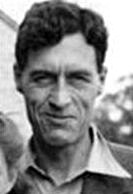
Patrick Maynard Stuart Blackett, Baron Blackett,, was a British experimental physicist known for his work on cloud chambers, cosmic rays, and paleomagnetism, awarded the Nobel Prize in Physics in 1948. In 1925 he became the first person to prove that radioactivity could cause the nuclear transmutation of one chemical element to another. He also made a major contribution in World War II advising on military strategy and developing operational research. His views saw an outlet in third world development and in influencing policy in the Labour government of the 1960s.

The Santa Fe Institute (SFI) is an independent, nonprofit theoretical research institute located in Santa Fe, New Mexico, United States and dedicated to the multidisciplinary study of the fundamental principles of complex adaptive systems, including physical, computational, biological, and social systems. The institute is ranked 24th among the world's "Top Science and Technology Think Tanks" and 24th among the world's "Best Transdisciplinary Research Think Tanks" according to the 2020 edition of the Global Go To Think Tank Index Reports, published annually by the University of Pennsylvania.
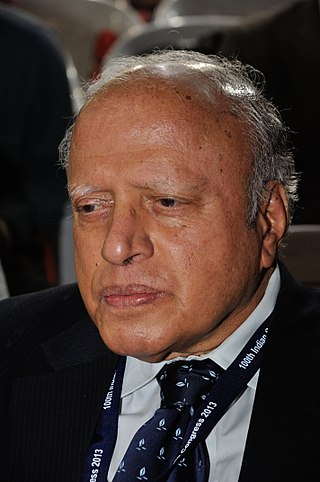
Mankombu Sambasivan Swaminathan was an Indian Agronomist, Agricultural scientist, Geneticist, Administrator and Humanitarian. Swaminathan was a global leader of the green revolution. He has been called the main architect of the green revolution in India for his leadership and role in introducing and further developing high-yielding varieties of wheat and rice. Swaminathan's collaborative scientific efforts with Norman Borlaug, spearheading a mass movement with farmers and other scientists and backed by public policies, saved India and Pakistan from certain famine-like conditions in the 1960s. His leadership as director general of the International Rice Research Institute (IRRI) in the Philippines was instrumental in his being awarded the first World Food Prize in 1987, recognized as one of the highest honours in the field of agriculture. The United Nations Environment Programme has called him "the Father of Economic Ecology". He was recently conferred the Bharat Ratna, the highest civilian award of the Republic of India, in 2024.
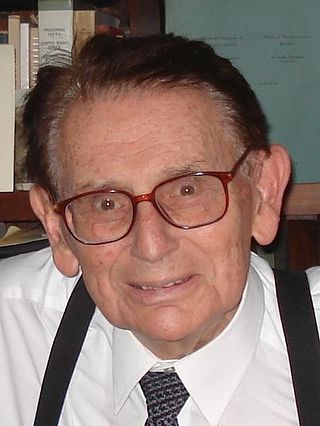
Marcos Moshinsky Borodiansky was a Mexican physicist of Ukrainian-Jewish origin whose work in the field of elementary particles won him the Prince of Asturias Prize for Scientific and Technical Investigation in 1988 and the UNESCO Science Prize in 1997.

The Joint Institute for Nuclear Research, in Dubna, Moscow Oblast, Russia, is an international research center for nuclear sciences, with 5500 staff members including 1200 researchers holding over 1000 Ph.Ds from eighteen countries. Most scientists are scientists of Russian Federation.
The Shanti Swarup Bhatnagar Prize for Science and Technology (SSB) is a science award in India given annually by the Council of Scientific and Industrial Research (CSIR) for notable and outstanding research, applied or fundamental, in biology, chemistry, environmental science, engineering, mathematics, medicine, and physics. The prize recognizes outstanding Indian work in science and technology. It is the most coveted award in multidisciplinary science in India. The award is named after the founder Director of the Council of Scientific & Industrial Research, Shanti Swarup Bhatnagar. It was first awarded in 1958.
The International Commission for Optics (ICO) was created in 1947 with the objective to contribute, on an international basis, to the progress and dissemination of the science of optics and photonics and their applications. It emphasises the unity of the crossdisciplinary field of optics.
Stuart Alan Rice is an American theoretical chemist and physical chemist. He is well known as a theoretical chemist who also does experimental research, having spent much of his career working in multiple areas of physical chemistry. He is currently the Frank P. Hixon Distinguished Service Professor Emeritus at the University of Chicago. During his tenure at the University of Chicago, Rice has trained more than 100 Ph.D. students and postdoctoral researchers. He received the National Medal of Science in 1999.

The World Academy of Sciencesfor the advancement of science in developing countries (TWAS) is a merit-based science academy established for developing countries, uniting more than 1,400 scientists in some 100 countries. Its principal aim is to promote scientific capacity and excellence for sustainable development in developing countries. It was formerly known as the Third World Academy of Sciences. Its headquarters is located on the premises of the International Centre for Theoretical Physics in Trieste, Italy.
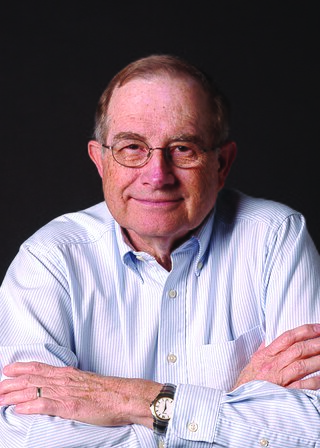
Cornelius Francis "Neal" Lane, is an American physicist and senior fellow in science and technology policy at Rice University's Baker Institute for Public Policy and Malcolm Gillis University Professor Emeritus of Physics and Astronomy Emeritus at Rice University in Houston, Texas.
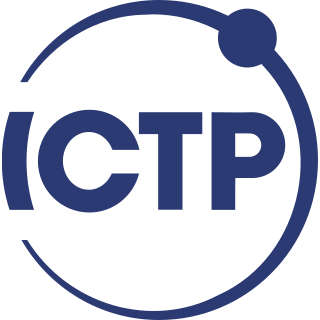
The Abdus Salam International Centre for Theoretical Physics (ICTP) is a research center for physical and mathematical sciences, located in Trieste, Friuli-Venezia Giulia, Italy.

The L'Oréal-UNESCO For Women in Science Awards, created in 1998, aim to improve the position of women in science by recognizing outstanding women researchers who have contributed to scientific progress. The awards are a result of a partnership between the French company L'Oréal and the United Nations Educational, Scientific and Cultural Organization (UNESCO) and carry a grant of $100,000 USD for each laureate. This award is also known as the L'Oréal-UNESCO Women in Science Awards.
Through history, the systems of economic support for scientists and their work have been important determinants of the character and pace of scientific research. The ancient foundations of the sciences were driven by practical and religious concerns and or the pursuit of philosophy more generally. From the Middle Ages until the Age of Enlightenment, scholars sought various forms of noble and religious patronage or funded their own work through medical practice. In the 18th and 19th centuries, many disciplines began to professionalize, and both government-sponsored "prizes" and the first research professorships at universities drove scientific investigation. In the 20th century, a variety of sources, including government organizations, military funding, patent profits, corporate sponsorship, and private philanthropies, have shaped scientific research.

Science and technology is a growing field in Pakistan and has played an important role in the country's development since its founding. Pakistan has a large pool of scientists, engineers, doctors, and technicians assuming an active role in science and technology. The real growth in science in Pakistan occurred after the establishment of the Higher education Commission in 2002 which supported science in a big way and also became the major sponsor of the Pakistan Academy of Sciences under the leadership of Prof. Atta-ur-Rahman. The emphasis was placed on quality rather than numbers during this period. The quality measures introduced by Prof. Atta-ur-Rahman as Founding Chairman HEC included:1) All Ph.D. thesis were evaluated by eminent foreign scientists,2) All PhD theses and research papers were checked for plagiarism 3) Some 11,000 students were sent abroad to leading universities for PhD level training and absorbed on their return, 4) Appointments at faculty positions were linked to international stature of the applicants as judged from their international publications, patents and citations, and (5) Quality Enhancement Cells were established in all universities for the first time in the history of the country. (6) The minimum criteria for establishment of a new university were approved by the Cabinet and universities that did not meet these criteria were closed down. (7) The Model University Ordinance was approved setting the governance parameters for new universities. (8) A list of fake higher education institutions was prepared and made public. (9) Quality Assurance Agency (QAA) was set up within the Higher Education Commission that established Quality Enhancement Cells (QECs) as its operational units in public and private-sector universities across the country. (10) The funding of universities was linked to excellence in teaching and research under a formula based funding mechanism that considered enrolment, subjects and quality of teaching and research. The first IT policy and implementation strategy was approved under the leadership of Prof. Atta-ur-Rahman, then Federal Minister of Science & technology, in August 2000 which laid the foundations of the development of this sector On the request of Prof. Atta-ur-Rahman, Intel initiated a nationwide programme to train school teachers in Information and Communication technologies in March 2002 which has led to the training of 220,000 school teachers in 70 districts and cities across Pakistan. A 15-year tax holiday was approved on the recommendation of Prof. Atta-ur-Rahman which has resulted in growth of IT business from $30 million in 2001 to over $3 billion. The Pakistan Austria University of Applied Engineering (Fachhochschule) has been established in Haripur Hazara under a Steering Committee Chaired by Prof. Atta-ur-Rahman in which students will get degrees from several Austrian universities. Pakistan's growth in scientific output can be seen from the fact that in 1990 Pakistan published 926 scholarly documents while in 2018 the number rose to 20548, a twenty times increase.In contrast India published 21443 scholarly documents in 1990 and the number rose to 171356 in 2018, an eight times increase. In 2018, 336 people per million were researchers in the R&D in Pakistan compared to 256 people per million being researchers in India. The reforms begun by Prof. Atta-ur-Rahman FRS in 2003-2008 have continued over the subsequent decade and according to the Web of Science report, there was a 300% growth in research publications in 2019 over the decade, with 2019 marking the first year in which Pakistan was ranked above the world average in research. In 2019, Pakistan produced 300% more publications indexed in the Web of Science Core Collection than in 2010. In the decade of 2010-2019, more than half of Pakistan’s research was published in journals with Impact Factor. The global influence of Pakistan’s research is increasing as scientists in the country are publishing more in top quartile journals. The Category Normalized Citation Impact of Pakistan’s publications has risen from 0.67 to 1.03. output. As of 2020, Pakistan has 85% teledensity with 183 million cellular, 98 million 3G/4G and 101 million broadband subscribers, due to the foundations laid by Prof. Atta-ur-Rahman of the IT and telecom industry during 2000-2008. In an analysis of scientific research productivity of Pakistan, in comparison to Brazil, Russia, India and China, Thomson Reuters has applauded the developments that have taken place as a result of the reforms introduced by Prof. Atta-ur-Rahman FRS, since Pakistan has emerged as the country with the highest increase in the percentage of highly cited papers in comparison to the "BRIC" countries
The Nevill Mott Medal and Prize is an award presented in selected years by the Institute of Physics in the United Kingdom, for distinguished research in condensed matter or materials physics. It was first established in 1997 thanks to a donation from Sir Nevill Mott's family. Sir Nevill Mott was one of the outstanding British condensed matter theorists and won a Nobel Prize in Physics in 1977. He died in 1996. The award consists of a silver medal and a prize of £1000.
John B. Bell is an American mathematician and the Chief Scientist of the Computational Research Division at the Lawrence Berkeley National Laboratory. He has made contributions in the areas of finite difference methods, numerical methods for low Mach number flows, adaptive mesh refinement, interface tracking and parallel computing. He has also worked on the application of these numerical methods to problems from a broad range of fields, including combustion, shock physics, seismology, flow in porous media and astrophysics.
Vallampadugai Srinivasa Raghavan Arunachalam was an Indian scientist and former head of Defence Research & Development Organization (DRDO). He was the founder and chairman of CSTEP, a science and technology think tank.
Kalpathy Ramaier Katchap Easwaran is an Indian molecular biophysicist, academic and a former Astra Chair Professor and chairman of the department of molecular biophysics of the Indian Institute of Science. He is known for his contributions in the development of anti-fungal drugs and for his researches on ionophores and ion-transport across membranes. He is an elected fellow of the Indian National Science Academy and the Indian Academy of Sciences. The Council of Scientific and Industrial Research, the apex agency of the Government of India for scientific research, awarded him the Shanti Swarup Bhatnagar Prize for Science and Technology, one of the highest Indian science awards, in 1984, for his contributions to biological sciences.
 United Kingdom) "for his discovery of a process for the demineralization of sea water." [2]
United Kingdom) "for his discovery of a process for the demineralization of sea water." [2]  Mexico) and International Rice Research Institute (
Mexico) and International Rice Research Institute ( Philippines) "for their work which made it possible to produce, in the space of a few years, improved strains of cereals." [2]
Philippines) "for their work which made it possible to produce, in the space of a few years, improved strains of cereals." [2]  Soviet Union) "for his theory on the hydromorphic origin of the soils of the great plains of Asia, Africa, Europe and the Americas" and nine researchers from
Soviet Union) "for his theory on the hydromorphic origin of the soils of the great plains of Asia, Africa, Europe and the Americas" and nine researchers from  Austria "for their development of the L-D process designed for recovery of steel from low phosphorus pig iron." [2]
Austria "for their development of the L-D process designed for recovery of steel from low phosphorus pig iron." [2]  France) "for his findings on the low-cost mass production of new proteins from petroleum." [2]
France) "for his findings on the low-cost mass production of new proteins from petroleum." [2]  United Kingdom) "for their work on synthetic insecticides related to natural pyrethrum." [2]
United Kingdom) "for their work on synthetic insecticides related to natural pyrethrum." [2]  Costa Rica) "for his work on the relationship between malnutrition and infection, particularly in infants" and Vincent Barry's group of scientists from the Medical Research Council (Ireland) (
Costa Rica) "for his work on the relationship between malnutrition and infection, particularly in infants" and Vincent Barry's group of scientists from the Medical Research Council (Ireland) ( Ireland) "for their work on the synthesis of an anti-leprosy agent, B-633." [2]
Ireland) "for their work on the synthesis of an anti-leprosy agent, B-633." [2]  United Kingdom) "for his work on the role of maternal nutrition and lactation in infant growth." [2]
United Kingdom) "for his work on the role of maternal nutrition and lactation in infant growth." [2]  Australia) "for their work on the biological control of Salvinia molesta infestations in the Sepik River Basin of Papua New Guinea." [2]
Australia) "for their work on the biological control of Salvinia molesta infestations in the Sepik River Basin of Papua New Guinea." [2]  China) "for his work leading to the creation of an hybrid rice with high yield potential." [2]
China) "for his work leading to the creation of an hybrid rice with high yield potential." [2]  Brazil) "for her work in exploiting biological nitrogen fixation as the major source of nitrogen in tropical agriculture." [2]
Brazil) "for her work in exploiting biological nitrogen fixation as the major source of nitrogen in tropical agriculture." [2]  Venezuela) "for their contribution to the development of hydrocracking distillation and hydrotreatment technology." [2]
Venezuela) "for their contribution to the development of hydrocracking distillation and hydrotreatment technology." [2]  Mexico) for his contribution to the phenomenon of catalysis. [2]
Mexico) for his contribution to the phenomenon of catalysis. [2]  China) "for his contribution to the Chinese photocomposition system". [2]
China) "for his contribution to the Chinese photocomposition system". [2]  Mexico) "for his work in nuclear physics." [2]
Mexico) "for his work in nuclear physics." [2]  Pakistan) "for his work in organic chemistry which has contributed to the development of plant-based therapies for cancer, AIDS and diabetes" and José Leite Lopes (
Pakistan) "for his work in organic chemistry which has contributed to the development of plant-based therapies for cancer, AIDS and diabetes" and José Leite Lopes ( Brazil) "for his contribution to the development of physics in Latin America." [2]
Brazil) "for his contribution to the development of physics in Latin America." [2]  Mexico/
Mexico/ Spain) "for his ability to relate his research in rheology and new materials to technological applications." [2]
Spain) "for his ability to relate his research in rheology and new materials to technological applications." [2]  Thailand) "for research on areas of renewable energy and drying technology." [1]
Thailand) "for research on areas of renewable energy and drying technology." [1]  Mexico/
Mexico/ Russia) "for his pioneer contributions in development of fractal mechanics and improving exploration techniques for the oil industry". [3]
Russia) "for his pioneer contributions in development of fractal mechanics and improving exploration techniques for the oil industry". [3] 









